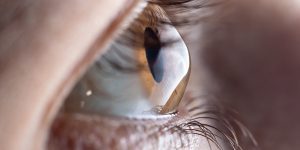The Cons of Keratoconus
January 31, 2023

Poor eyesight seems to be very common these days, with people scorching their eyes from staring at computer screens 8 hours per day. Many are fortunate to be born with good eyes, though hinder their eyesight via excessive electronic use. Others, though, can be born with poor eyesight, sometimes through hereditary diseases. One hereditary eye disease that impairs vision tremendously is Keratoconus, which is an eye disease that affects the structure of the cornea. As described by the American Academy of Ophthalmology, “the cornea is the clear, dome-shaped window at the front of an eye that focuses light into your eye.”
When someone has Keratoconus, their cornea thins out and bulges like a cone. The misshapen cornea brings light rays out of focus, distorting one’s vision. Because of this, it makes daily tasks difficult, such as reading and driving. Approximately one in 2,000 people have this condition, and signs of it typically emerge during puberty. There are a few causes and risk factors of Keratoconus. The main one is obtaining it hereditarily, as one in ten people who have the disease have a close family relative who has it too. Another cause of Keratoconus is frequent eye rubbing, specifically aggressive “knuckling” eye rubbing. Frequent eye rubbing could lead to misshaping your cornea, leading you to develop the disease. The last possible cause or risk factor is having a history of asthma, allergies, Ehlos Danlers syndrome, Down’s syndrome, or retinitis pigmentosa.
Although Keratoconus can impair your vision harshly, there are easy ways to treat it. When treating Keratoconus, Melissa Daluvoy MD said “early detection allows the greatest number of treatment options, including the chance to halt the progression of keratoconus”. For the milder cases of Keratoconus, patients can get traditional contact lenses and glasses to battle their impaired vision. For the more advanced cases, specialty contact lenses may be recommended, along with possible cornea transplant surgery.
I can attest to the struggles of dealing with Keratoconus, as it runs in my family. Thankfully, I do not have it, but my dad has it, and his vision has very much been impacted by Keratoconus. His condition of Keratoconus is so severe that he has gotten two cornea transplant surgeries. He also has to wear hard contact lenses because soft contact lenses cannot reshape the cornea for him to see. He also is unable to drive a car without his contacts in, and has a really hard time driving with just his glasses. Learning more about Keratoconus has made me think about the future of my eyesight, as I have had fairly good eyesight up to this point in my life. It has also made me thankful for my good health, as the fact that simple tasks such as reading and driving are made difficult from Keratoconus blows my mind. According to Xiao-Han Zhang and Xuan Li, “[Keratoconus] has a great impact on patients’ quality of life and mental health.” With that, you should always remember to never take good health for granted, as there are many who suffer from Keratoconus and far worse.



Nihaal Kochar • Feb 8, 2023 at 7:23 pm
This is a compelling and powerful article, Justin — awesome job. Life is a gift and the riches that it offers shouldn’t be taken for granted.